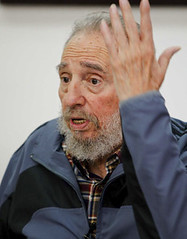
Leader of the Communist Party of Cuba Fidel Castro appeared on national television July 11, 2010. He discussed the situation involving the role of United States imperialism in the Korean Peninsula and the Persian Gulf.
Originally uploaded by Pan-African News Wire File Photos
07:17 Mecca time, 04:17 GMT
Cuba's Castro in fighting form
Castro said he believed a confrontation between the US and Iran was imminent
Appearing relaxed, cogent and in fighting form, Fidel Castro, Cuba's
former president, has made his first major television appearance in
three years, and immediately took on old nemesis the United States.
Speaking slowly but clearly, the 83-year-old former revolution leader,
who has been in ill health, talked about the conflict between North
and South Korea at the start of the interview on Monday on a daily
Cuban current events talk show.
He accused the US of sinking a South Korean warship in March, an
attack Seoul and an international team of investigators blamed on
Pyongyang.
He also spoke about his belief that a confrontation between the US and Iran was imminent, saying nuclear war could break out when the US, in alliance with Israel, tries to enforce international sanctions against Iran for its nuclear activities.
"When they launch war, they're going to launch it there. It cannot
help but be nuclear," he said. "I believe the danger of war is growing
a lot. They are playing with fire," he said.
Castro spoke haltingly at first, but gathered steam as he outlined
long grievances against the US and detailed its large store of nuclear
arms and heavy military spending.
"The United States spends more than all the other countries together
on defence," he said, leafing through papers to check his facts.
Domestic message
Philip Brenner, a Cuban analyst and professor of US foreign policy at
American University, said the message was intended for domestic
consumption, but also held a likely honest concern about US foreign
policy.
"What this tells people internally is that the United States can't be
trusted," he said. "'Those of you who want to get closer to the United
states, be careful. I've watched it'."
"[Castro] pointedly talked about the US administration increasing
military spending, the US now spends more that all the other countries combined. So I think there is a real concern about war, we should take this I think at face value."
Monday's interview on the "Round Table" news and analysis show that airs on state-run television, came as the government began freeing 52 political prisonersunder a landmark deal brokered with the Catholic Church last week.
Castro did not mention the release of the dissidents, who were
imprisoned in a crackdown on the opposition in 2003 while he was still in power.
It was a rare appearance for a man who has stayed largely out of the
public eye since undergoing emergency intestinal surgery in July 2006, forcing him from power.
Monday's highly anticipated interview, the first since he was seen in
a series of videotaped discussions in 2007, was announced in a
front-page story in the Communist-party daily Granma earlier in the
day.
'Positive effect'
Cuban media later showed footage of workers watching the elder Castro on large screens set up at their workplaces.
"I think it will have a positive effect on people," David Suarez, a
21-year-old student, told The Associated Press news agency.
"It will give hope that once again he will help to solve our problems."
Castro's latest appearance comes just days after he was photographed in public for the time since 2006.
Images of him greeting workers at a Havana think-tankwere published in Cuban media on Saturday.
Castro ruled Cuba for 49 years after leading the 1959 revolution that
toppled Fulgencio Batista, a US-backed dictator.
He dominated Cuban life, often making long, televised speeches and numerous public appearances.
He resigned the presidency in February 2008 and permanently handed power to his brother, Raul Castro, 79, who officially took over as president in a vote by the National Assembly.
Source: Al Jazeera and agencies
----------------------------------------------------------
No comments:
Post a Comment